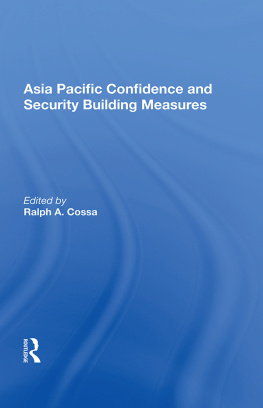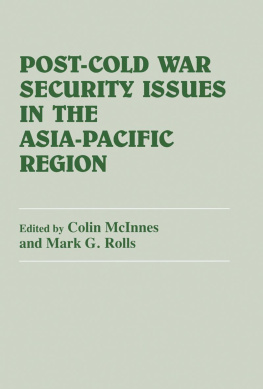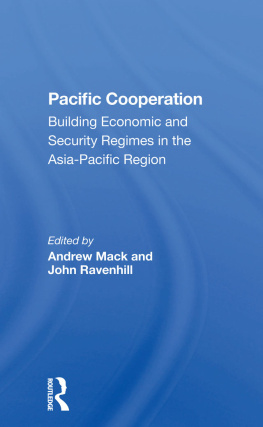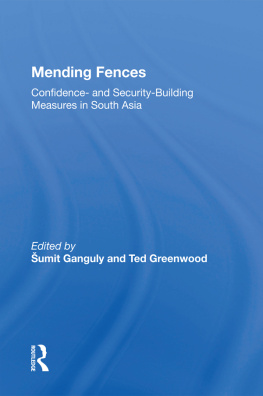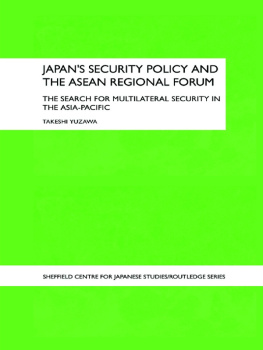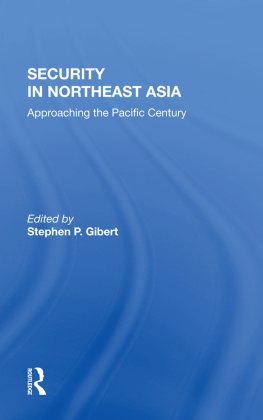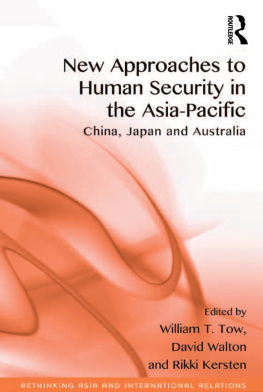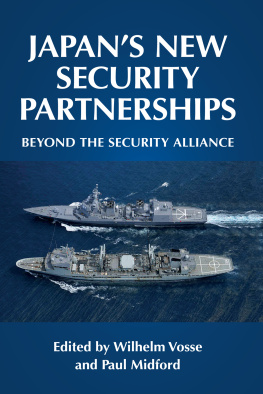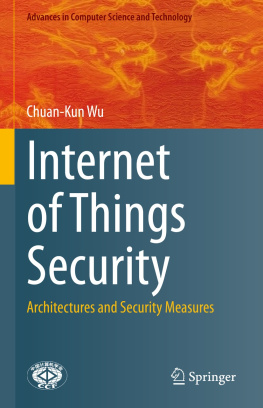Asia Pacific Confidence and Security Building Measures
Significant Issues Series
SIGNIFICANT ISSUES SERIES papers are written for and published by the Center for Strategic and International Studies.
Series Editors: David M. Abshire
Douglas M. Johnston
Director of Studies:Erik R. Peterson
Director of Publications: Nancy B. Eddy
Managing Editor: Roberta L. Howard
Associate Editor: Yoma Ullman
The Center for Strategic and International Studies (CSIS), founded in 1962, is an independent, tax-exempt, public policy research institution based in Washington, D.C. The mission of the Center is to advance the understanding of emerging world issues in the areas of international economics, politics, security, and business. It does so by providing a strategic perspective to decision makers that is integrative in nature, international in scope, anticipatory in its timing, and bipartisan in its approach. The Centers commitment is to serve the common interests and values of the United States and other countries around the world that support representative government and the rule of law.
CSIS, as a public policy research institution, does not take specific policy positions.-Accordingly, all views, positions, and conclusions expressed in this publication should be understood to be solely those of the authors.
Based in Honolulu, the Pacific Forum CSIS operates as the autonomous Asia-Pacific arm of CSIS. Founded in 1975, the thrust of the Forums work is to help develop cooperative policies in the Asia-Pacific region through debate and analyses undertaken with the regions leaders in the academic, government, and corporate arenas. The Forum collaborates with a network of more than 30 research institutes around the Pacific Rim, drawing on Asian perspectives and disseminating its projects findings and recommendations to opinion leaders, governments, and publics throughout the region.
The Center for Strategic and International Studies
1800 K Street, N.W.
Washington, D.C. 20006
Telephone: (202) 887-0200
Fax: (202) 775-3199
First published 1995 by Westview Press
Published 2018 by Routledge
52 Vanderbilt Avenue, New York, NY 10017
2 Park Square, Milton Park, Abingdon, Oxon OX14 4RN
Routledge is an imprint of the Taylor & Francis Group, an informa business
Copyright 1995 by the Center for Strategic and International Studies
All rights reserved. No part of this book may be reprinted or reproduced or utilised in any form or by any electronic, mechanical, or other means, now known or hereafter invented, including photocopying and recording, or in any information storage or retrieval system, without permission in writing from the publishers.
Notice:
Product or corporate names may be trademarks or registered trademarks, and are used only for identification and explanation without intent to infringe.
Library of Congress Cataloging-in-Publication Data
Asia Pacific confidence and security building measures / [edited
by] Ralph A. Cossa.
p. cm.(Significant issues series, ISSN 0736-7136; v. 17, no. 3)
ISBN 0-89206-307-6
1. AsiaPolitics and government1945-2. Pacific Area
Politics and government. 3. National securityAsia. 4.
National securityPacific Area. I. Cossa, Ralph A. II.
Series.
DS35.2.A7977 1995
327.17095dc20
95-12882
CIP
ISBN 13: 978-0-367-02253-2 (hbk)
Contents
1
Asia Pacific Confidence and Security Building Measures
Ralph A. Cossa
2
Building Community or Building Conflict? A Typology of Asia Pacific Security Challenges
Robert A. Manning
3
The Anatomy of Anxiety in the Emerging East Asia Security Order
Oh Kwan-chi
4
Asia Pacific Security Concerns: A Singaporean Perspective
Kwa Chong Guan
5
A Survey of Confidence and Security Building Measures
M. Susan Pederson and Stanley Weeks
6
Confidence Building in the Asia Pacific Region: Prospects and Problems
Margaret (Peggy) Mason
7
Step-by-Step Confidence and Security Building for the Asian Region: A Chinese Perspective
Liu Huaqiu
8
Confidence and Security Building Measures: A USCSCAP Task Force Report
Brad Roberts and Robert Ross
Guide
Ralph A. Cossa is executive director of the Pacific Forum CSIS in Honolulu. He is also executive director of the U.S. Committee of the Council for Security Cooperation in the Asia Pacific (US-CSCAP). He helps direct the efforts of the multinational CSCAP Working Group on Confidence and Security Building Measures (CSBMs) in the Asia Pacific.
Kwa Chong Guan is vice chairman of the Singapore Institute of International Affairs and head of the Department of Strategic Studies at the Singapore Armed Forces Training Institute. He served previously as a policy analyst in the Singapore Ministry of Defence and as a foreign affairs officer.
Liu Huaqiu is a senior fellow and director of the Program on Arms Control and Disarmament at the China Defense Science and Technology Information Center in Beijing, which is subordinated to the Commission of Science, Technology, and Industry for National Defense of the Peoples Republic of China. During 19861987, he was a visiting fellow at the Center for International Security and Arms Control at Stanford University.
Robert A. Manning is a senior fellow at the Progressive Policy Institute in Washington, D.C., and a research associate at the Sigur Center for East Asian Studies of George Washington University. From 1989 to 1993, he was adviser for policy to the U.S. assistant secretary of state for East Asian and Pacific affairs.
Margaret (Peggy) Mason is an external fellow at the Centre for International and Strategic Studies in Toronto. She is a member of the United Nations Secretary Generals Advisory Board on Disarmament Matters and chairs a UN Group of Governmental Experts study on verification. From 1989 to 1994 she was Canadas ambassador for disarmament.
Oh Kwan-chi is a senior research fellow and former vice president of the Korea Institute for Defense Analysis in Seoul. He previously served as director of KIDAs Arms Control Research Center. He is a retired Republic of Korea Army colonel.
M. Susan Pederson is assistant vice president and manager of the Programs and Policy Division of the Science Applications International Corporation in McLean, Virginia. She was formerly a member of U.S. delegations to the Conference on Security and Cooperation in Europe.
Brad Roberts is a research fellow at the Center for Strategic and International Studies in Washington, D.C., where he also serves as editor of The Washington Quarterly. He is cochair of the USCSCAP CSBM task force.
Robert Ross is an associate professor at Boston University and a research associate at the John King Fairbank Center for East Asia Research at Harvard University. He is cochair of the USCSCAP CSBM task force. He is currently a visiting professor at the College of Foreign Affairs in Beijing.
Stanley Weeks is a senior scientist with the Science Applications International Corporation in McLean, Virginia, and a member of the UN Maritime Experts Group. He acted as a military consultant and naval analyst for CBS News during the 1991 Gulf War.
Until recently, multilateral approaches to confidence building in the Asia Pacific region or to regional security issues in general were resisted by the United States and most of its Asia Pacific neighbors. In the past two years, however, attitudes have changed significantly The Council for Security Cooperation in the Asia Pacific (CSCAP) has been at the forefront of this change.

